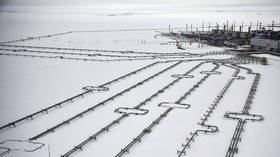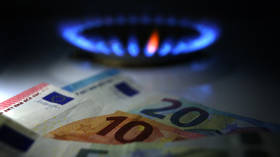EU accuses Russia of gas ‘blackmail’

Ursula von der Leyen, the President of the European Commission, has accused Russia of using natural gas supplies as an “instrument of blackmail” following Gazprom's decision to halt exports to Poland and Bulgaria on Wednesday. Warsaw and Sofia failed to pay for Russian gas deliveries in April in rubles, Russia's state-owned energy corporation explained.
Last month, President Vladimir Putin announced that so-called "unfriendly countries" would have to pay for energy in Russia's own currency.
In a statement released on Wednesday, von der Leyen claimed that the "announcement by Gazprom that it is unilaterally stopping delivery of gas to customers in Europe is yet another attempt by Russia to use gas as an instrument of blackmail."
The Commission president went on to describe the decision as “unjustified and unacceptable,” adding that it further highlighted the “unreliability of Russia as a gas supplier.”
Brussels has been “working to ensure alternative deliveries and the best possible storage levels across the EU,” von der Leyen insisted. The EU leader added that contingency plans had been developed for such a scenario in EU member states and that “international partners” could help the EU “secure alternative flows,” without providing specifics.
Von der Leyen’s “gas blackmail” allegation echoes comments made on Wednesday by the Polish and Bulgarian prime ministers.
Speaking in Poland's parliament, Prime Minister Mateusz Morawiecki said he considered the gas cut-off to be Russia's revenge for the latest round of sanctions that Warsaw imposed on Moscow over its military offensive against Ukraine. Poland’s punitive measures were announced on Tuesday and target Russian individuals and companies, including Gazprom.
Morawiecki reassured lawmakers that Poland would not face an energy crisis as a result of today's supply shutdown, citing years of efforts by Warsaw to secure gas supplies from other sources.
Meanwhile, Petr Naimsky, a Polish government official in charge of the country’s strategic energy infrastructure, confirmed in a radio interview that Warsaw would no longer buy gas from Russia.
Bulgarian Prime Minister Kiril Petkov denounced Gazprom’s decision as a “gross violation of their contract” and “blackmail.” He also emphasized that Bulgaria “will not succumb to such a racket.”
On Wednesday morning, Gazprom announced a complete halt in gas exports to Bulgaria and Poland, citing the two countries' failure to make payments in rubles for the fuel delivered in April. The Russian energy giant made it clear that a resumption of gas supplies would only occur when Sofia and Warsaw comply with the payment scheme proposed by Russia.
Gazprom also warned that should Bulgaria and Poland start siphoning off Russian transit gas intended for other countries, the Russian company would reduce supplies by the amount Sofia and Warsaw have illegally withheld.
In its statement, Gazprom justified the cut-off by saying that “as of the end of the working day on 26 April, Gazprom Export had not received ruble payments for gas deliveries in April from the companies 'Bulgargaz' (Bulgaria) and PGNiG (Poland),” as required under President Vladimir Putin's decree dated 31 March. The Russian energy giant insisted that it had notified Warsaw and Sofia of the new payment scheme “in a timely manner.”
In late March, Putin required states which have imposed sanctions on Russia, and are still importing its gas, to make payments for the fuel in the Russian national currency. Several buyers have since signaled that they are ready to accept Moscow's demands. On Monday Uniper, Germany's largest importer of Russian gas, said it would be possible to pay for future supplies without breaching Western sanctions.

















